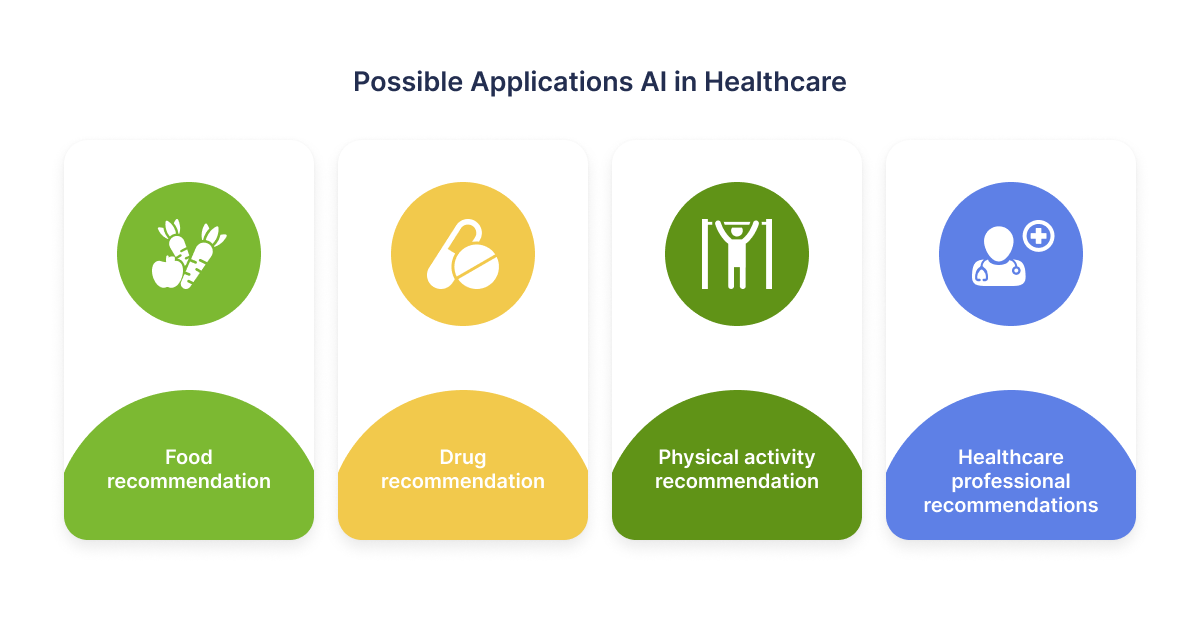Recommendation Systems in Healthcare
Modern technologies and their many possible applications are definitely making our lives better and more comfortable. They save our time and automate the processes on which we spend most of our precious time.
At the moment, Artificial Intelligence (AI) is a very significant invention for mankind. The greatest minds of this world have worked on its development and growth. It has penetrated almost all spheres of our lives, although we may not even think about it. The use of AI for Healthcare is one of the most important and significant applications of AI, because human life and health are among the most important priorities. But, How AI is used for healthcare?
What are recommendation systems?
Recommendation systems are a major application of AI in healthcare. Thanks to machine learning, these systems are ready to recommend to their users the most appropriate options from a variety of possible ones to achieve a desired goal. These can be goals related to leading a healthy lifestyle, as well as goals that help to overcome disease or recover from injuries.
Read also: AWS Services and Tools for Machine Learning
In general, recommendation systems and all similar programs are designed to make life easier for the customer. By analyzing data, they recommend what is appropriate for you. That is why they are currently in great demand. But, of course, before describing how AI solves problems in healthcare through recommendation systems, it is better to start by observing their operational models.
General models of recommendation systems
Of course, the goal of all recommendation systems is the same – to recommend you the most suitable solution (and to do so constantly so that you remain a user of the selected service). But to do this, such programs can use completely different algorithms. It is impossible to say unequivocally that some of these algorithms are better and some are worse. All of them are different and have both advantages and disadvantages. Here are the most common ones:
Popularity based recommendation model
The basis of this model is that it collects information about all users and, based on this data, makes a list of what is popular among the majority of people. Then, this system offers this option to most of its users. We can not talk about an individualized approach here, but, as practice shows, in most cases it may be enough.
Collaborative filtering
This model of recommendation system focuses on users and their tastes. That is, the system examines each individual member in detail and determines what he or she likes or dislikes. Then, the program assigns all users to certain categories. That is, people with similar tastes will be in the same category. After that, the software starts recommending to one user from a certain category what another user from this same category likes. In most cases this model shows itself very well and the recommendations turn out to be really useful. By the way, this model of recommendation system also tracks changes in user's tastes and moves them to other categories. That is, anything that will be recommended to you by the system will not be outdated.
Content-based filtering
Unlike in the previous case, this method focuses not on users, but on the content they consume. So, in other words, it analyzes what a person did or what he was interested in. The collected metadata is gathered by the recommendation system and based on it it finds similar content or products that may be of interest to the user.
In most cases, this model works really well and finds recommendations quickly. But, sometimes users lack novelty and variety which may make them want to switch to a different platform.
Hybrid recommendation systems
As you can understand from the name of this algorithm, using it, recommendation systems use several of the approaches described above simultaneously. Thus, all the disadvantages are minimized, while the advantages grow. As a consequence, the customer of such a system receives the most appropriate recommendations.
How is AI an advantage in healthcare? Possible applications
Food recommendation
Nutrition is an important part of a healthy lifestyle, as it determines a human's condition, energy level and appearance. Of course, with the modern rhythm of life, it can be very difficult to keep track of what you eat and what you need to eat to cover the daily norm of proteins, fats and carbohydrates, as well as not to exceed the number of calories. In order to make it easier for people to eat and to make meals more varied, food recommendation systems come in handy. Also, such applications are a great help if you have a special diet.
Read also: Diabetic Self-monitoring App — DiaHero™
Drug recommendation
This recommendation software is more oriented toward health care professionals, although ordinary people can benefit from it as well. Based on the diagnosis or illness you have entered, these programs can recommend some of the most appropriate medication options for the diagnosis or illness. You can learn in detail about the ingredients of each drug, what it is supposed to treat, what doses to take, and what side effects it may have. Such systems help doctors around the world to prescribe the most appropriate medicines to treat different patients.
Physical activity recommendation
There are applications that can recommend appropriate types of physical activity and its duration based on your goals. For example, if you have a healthy lifestyle, the program will remind you how many more calories you need to burn per day and can recommend the most effective exercises to do so. Also, if you have an injury, for example, the system can recommend exercise options to speed up the recovery process. The only thing required from you as a user is to provide the application with your goals and wishes. After that, you will start receiving suitable recommendations.
Read also: SaaS for Gyms — Gymistration
Healthcare professional recommendations
Sometimes it can be difficult to find a good doctor who will solve your health problem or who will give you a consultation and explain everything clearly. In this case, applications with recommendations of the best specialists have proven to be a good option. Such platforms collect data about your geographical location, your health goals and concerns. Based on this, they offer you top specialists who have been liked by other people with similar problems or diseases. This is a great opportunity to find a good professional.

Seek partner? Try SDH
As you can deduce from the information we have provided above, in Healthcare AI plays a very important role. This is the reason why it is crucial to keep on developing in this direction to make the healthcare and medical spheres even better.
You might be the one with an idea for a really cool solution that can help millions of people with its recommendations! So what are you waiting for? Write to us now and let's set up a consultation from SDH!
One such product we applied AI on is Diahero, a diabetes self-management app created by our team. We tried to use machine learning principles to create algorithms for personalized dietary recommendations. Today, SDH continues to work on existing and new models, as well as systematically increasing the percentage of automation and improving our users' experience.
Software Development Hub team of experts are the people you can rely on throughout the entire project process. We are ready to work with you on creating a project plan, presentation, development, testing, technical support and much more. Our goal is to develop a quality solution that will effectively solve the tasks set for it. If you are willing to do the same – you have already found your ideal partner!
Categories
About the author
Share
Need a project estimate?
Drop us a line, and we provide you with a qualified consultation.







